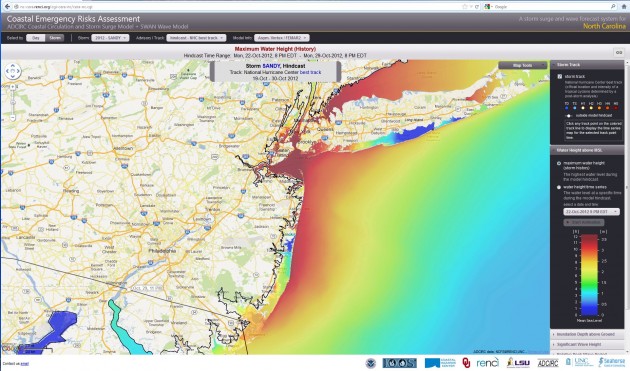
An ASGS hindcast of water inundation resulting from Hurricane Sandy, with reds showing the highest surge and inundation levels. A hindcast uses actual storm data to compare numerical models to actual storm data and thereby measure the accuracy of the models. For Hurricane Sandy, ASGS models were as accurate or better than those used by the National Weather Service.
CHAPEL HILL, NC, June 20, 2013 – International Data Corporation (IDC) presented the 2013 HPC Innovation Excellence Awards last week at the ISC’13 supercomputing conference in Leipzig, Germany. Of the 11 awards presented, two were won by RENCI, the Renaissance Computing Institute at UNC-Chapel Hill.
NCGENES and the ADCIRC Surge Guidance System, both projects that depend on RENCI-developed technologies and computing resources, were among the projects recognized for using high performance computing to impact research, business and society.
NCGENES, a RENCI collaboration with the UNC School of Medicine, is a comprehensive informatics framework that systemizes the steps of genomic data analysis and uses high performance computing to mine genomic data for clinical and research uses. The framework tackles one of the most challenging problems in genomic medicine: the need to automatically sort through the millions of variants generated by genome-scale sequencing to identify the very few with clinical relevance. By zeroing in on these important variants in peoples’ genes, the researchers hope to better understand, observe, diagnose, and treat genetically-caused diseases in three broad categories: neurodevelopmental disorders in children, hereditary cancer susceptibility, and genetic cardiac disorders.
The NCGENES framework also serves as a proof of concept for how genomic medicine can be carried out without the high cost and time commitment of gene-by-gene analysis. NCGENES is funded by the National Human Genome Research Institute and led by Principal Investigator Jim Evans, MD, PhD, of the UNC School of Medicine. Kirk Wilhelmsen, MD, PhD, RENCI’s chief scientist for genomics and a UNC professor of genetics, is a co-PI on the project along with Jonathan Berg, MD, PhD, of the UNC School of Medicine. The RENCI technical team includes Phil Owen, Chris Bizon, PhD, Jason Reilly, Josh Salisbery, PhD, Charles Schmitt, PhD, and Dylan Young.
The ADCIRC Surge Guidance System (ASGS) couples the ADCIRC coastal circulation and storm surge model with the SWAN wave model to produce high-resolution forecasts of storm surge, near shore waves, and water inundation when tropical or extra-tropical storms threaten the U.S. Atlantic or Gulf coasts. ASGS includes an advanced Web-based display (the Coastal Emergency and Risk Assessment website) that models the path of advancing storms. During a storm, models run 2-4 times each day on a 150-node Dell PowerEdge M610/cluster at RENCI.
The outputs from these runs are incorporated into guidance and forecasting efforts by the National Weather Service, the National Hurricane Center, and agencies such as the U.S. Coast Guard, the U.S. Army Corps of Engineers, FEMA, and local and regional emergency management divisions. The resulting forecasts are used for evacuation decisions, to position supplies and response personnel, for search and rescue, and for other event-based decision support. RENCI Senior Research Scientist and Oceanographer Brian Blanton, PhD, works with Rick Luettich, ScD, co-developer of ADCIRC and director of the UNC Coastal Hazards Center and the UNC Institute of Marine Sciences on ASGS.
The HPC Innovation Excellence Awards recognize noteworthy achievements by users of high performance computing (HPC) technologies. The program’s main goals are to showcase return on investment (ROI) and scientific success stories involving HPC; to help other users better understand the benefits of adopting HPC and justify HPC investments, especially for small and medium-size businesses; to demonstrate the value of HPC to funding bodies and politicians; and to expand public support for increased HPC investments.
“IDC research has shown that HPC can impact innovation cycles greatly and can potentially generate ROI. The award program aims to collect a large set of success stories across many research disciplines, industries, and application areas,” said Chirag Dekate, research manager, high performance computing at IDC. “The winners achieved clear success in applying HPC to greatly improve business ROI, scientific advancement, and/or engineering successes. Many of the achievements also directly benefit society.”
IDC began the awards program in 2011 and winners have included organizations in the U.S., Europe, China, India, Canada and Australia.
For more information:
NCGENES
RENCI Media Contact:
Karen Green
919-445-9648 (office)
919-619-8213 (mobile)
kgreen@renci.org
@renci


